Since its introduction in 1993, the Buckingham Palace Summer Opening allows visitors a rare opportunity to explore the State Rooms of the monarch’s official London residence. 2024 was a record-breaking year for Buckingham Palace, which welcomed the most visitors in the history of its summer opening. In 2025, from Thursday, 10 July to Sunday, 28 September, guests will discover 19 magnificent rooms that have been the backdrop to centuries of royal history.
Buckingham Palace Summer Opening 2025
During the 2025 Summer Opening of Buckingham Palace,
visitors will see the opulent State Rooms used by members of the Royal Family for official entertaining, including the White Drawing Room, Throne Room and Ballroom. A visit to the State Rooms can be combined with a Garden Highlights Tour, which takes in areas of the Palace Garden including the Herbaceous Border, Summer House, Rose Garden and Waterloo Vase.
Visitors to Buckingham Palace will also be able to see the Diamond Jubilee State Coach, which conveyed Their Majesties to Westminster Abbey for the Coronation and which will be on display in the Palace’s State Entrance.
For more information about the Summer Opening of the State Rooms at Buckingham Palace and to book tickets, check out the website for the Royal Collection Trust. This can be easily combined with our Royal London Tour to discover and learn about additional Royal places in London – The home of the British Monarchy!
Note: If you are not able to visit during the Summer Opening, there may be an opportunity during the rest of the year on selected dates for small guided tours. Check the Royal Collection Trust website!
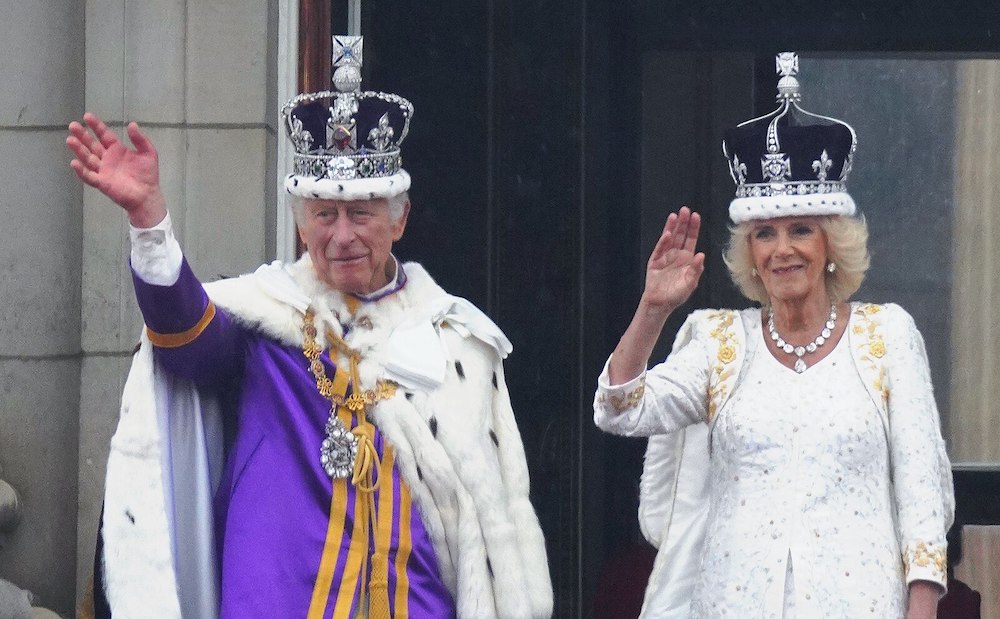 King Charles and Queen Camilla waving from the balcony of Buckingham Palace. Photo Credit: © Isaac Mayne/DCMS via Wikimedia Commons.
King Charles and Queen Camilla waving from the balcony of Buckingham Palace. Photo Credit: © Isaac Mayne/DCMS via Wikimedia Commons.
Buckingham Palace Facts & Figures
Buckingham Palace is the working headquarters of the Monarchy, where The Queen carries out her official and ceremonial duties as Head of State of the United Kingdom and Head of the Commonwealth. The Queen and The Duke of Edinburgh live in the private apartments on the north side of the Palace, while rooms on the upper floors of the north and east sides are occupied by other members of the Royal Family. Much of the ground floor and the south wing of the Palace are used by over 800 members of staff. Their jobs range from housekeeping to horticulture, catering to correspondence. Some of the more unusual jobs include fendersmith, clockmaker and flagman.
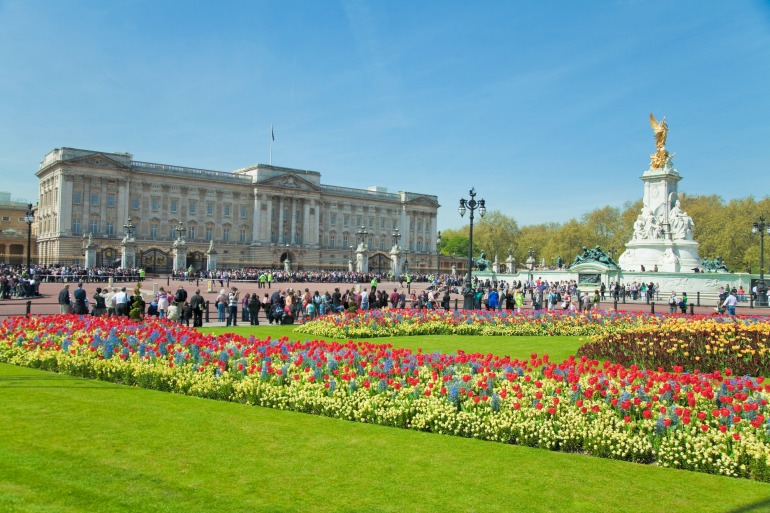
Buckingham Palace. Photo Credit: ©London & Partners.
The site where Buckingham Palace now stands was originally a mulberry garden planted by King James I to rear silkworms. Unfortunately, he chose the wrong kind of mulberry bush, and silk production never took off in Britain. By 1628 a substantial house already existed on the site and in 1698 it was let to John Sheffield (later the Duke of Buckingham) who demolished the property and rebuilt it as ‘Buckingham House’. In 1761 George III acquired the site as a private residence and the house underwent considerable remodelling and modernising. Buckingham House was transformed into Buckingham Palace in the 1820s by the architect John Nash for George IV, but the first monarch to use Buckingham Palace as their official residence was Queen Victoria, who moved there in 1837. The white Portland stone facade was created in 1913 by Sir Aston Webb.
Buckingham Palace is 108 metres long across the front, 120 metres deep (including the central quadrangle) and 24 metres high. The Palace has 775 rooms, including 19 Staterooms, 52 Royal and guest bedrooms, 188 staff bedrooms, 92 offices and 78 bathrooms. There are 1,514 doors and 760 windows. All windows are cleaned every six weeks. The palace has its own chapel, post office, swimming pool, staff cafeteria, doctor’s surgery and cinema. There are more than 350 clocks and watches in Buckingham Palace, one of the largest collections of working clocks anywhere.
More than 50,000 people visit the Palace each year as guests to State banquets, lunches, dinners, receptions and Garden Parties. Her Majesty also holds weekly audiences with the Prime Minister and receives newly-appointed foreign Ambassadors at Buckingham Palace. In 2015, Her Majesty hosted a reception for players, organisers and supporters of the Rugby World Cup.
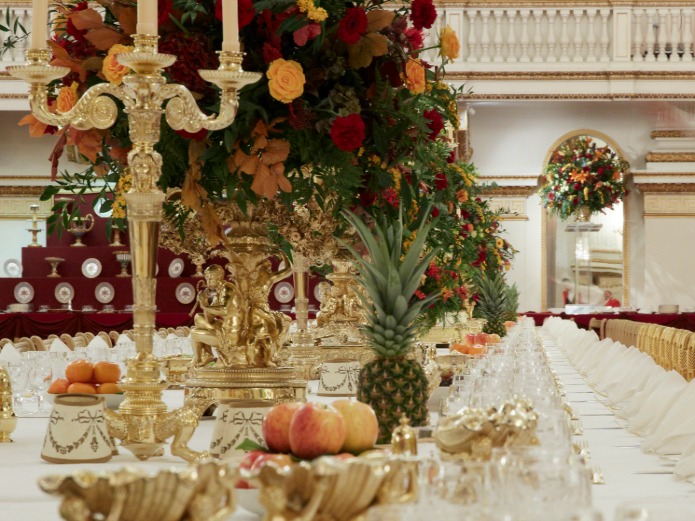
Buckingham Palace: The Ballroom set up for a State Banquet. Photo Credit: ©Royal Collection Trust/Her Majesty Queen Elizabeth II.
Garden Parties at Buckingham Palace
Buckingham Palace’s garden covers 40 acres and includes a helicopter landing area, a lake, and a tennis court. It is home to 30 different species of bird and more than 350 different wildflowers, some extremely rare.
The first Garden Party at Buckingham Palace was held by Queen Victoria in the 1860s. Today, there are usually three Garden Parties at the Palace every summer, each attended by approximately 8,000 people, who consume 27,000 cups of tea, 20,000 sandwiches and 20,000 cakes.
In 2002, a music concert was staged in the garden of Buckingham Palace to mark The Queen’s Golden Jubilee, which included an unforgettable performance of ‘God Save The Queen’ by Brian May from the roof of the Palace and at Her Majesty’s Diamond Jubilee celebrations in 2012 members of the public were invited to have a special picnic in the Buckingham Palace garden.
Hundreds of distinguished historic figures have visited Buckingham Palace, including a seven-year-old Wolfgang Amadeus Mozart, Charles Dickens, American Presidents including JF Kennedy and Barack Obama, Mahatma Gandhi (who wore a loincloth and sandals to tea with King George V), Neil Armstrong and Nelson Mandela.
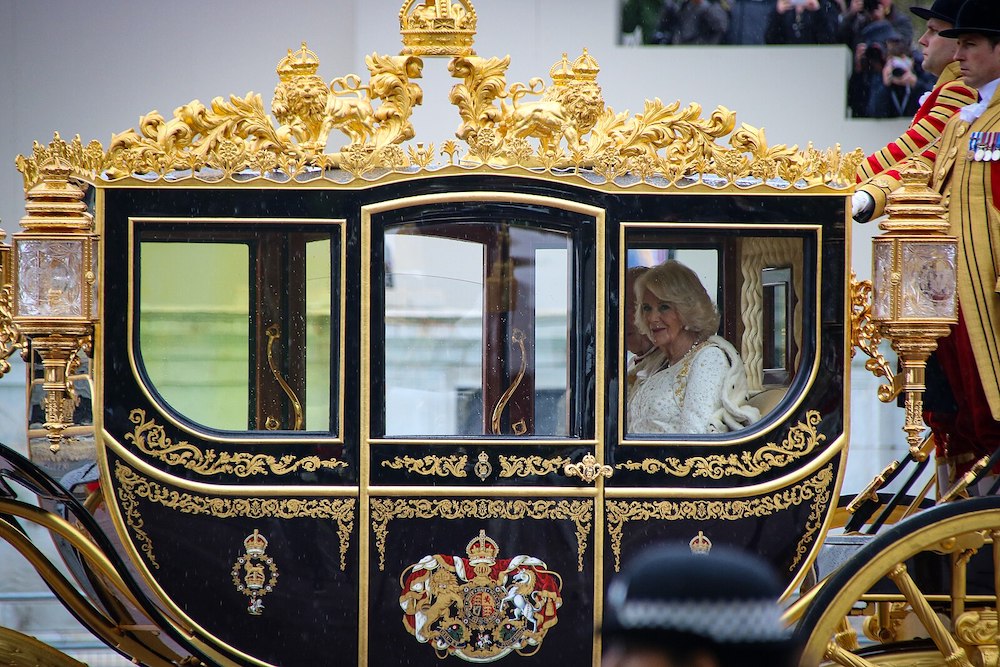 The King and Queen in the Diamond Jubilee State Coach Military Procession on The Mall. Photo Credit: © Pail Clarke / DCMS via Wikimedia Commons.
The King and Queen in the Diamond Jubilee State Coach Military Procession on The Mall. Photo Credit: © Pail Clarke / DCMS via Wikimedia Commons.



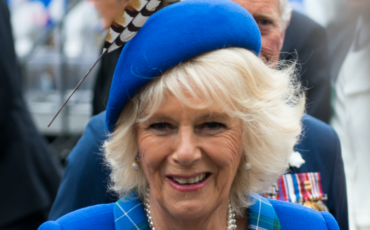


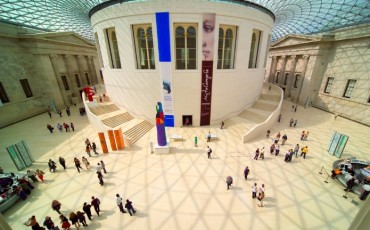
Leave a Reply